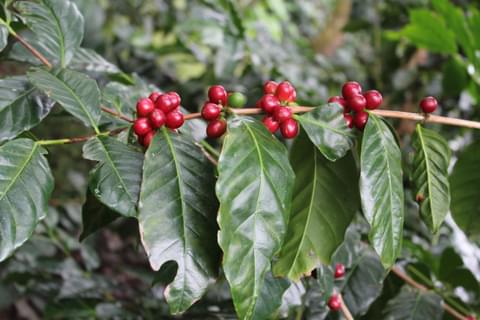
About the Catalog
The intention of this catalog is that those working with coffee should be able to make informed decisions about which variety will work best for their situation and needs.
About the Catalog
Information is power. There are dozens of widely cultivated Arabica and Robusta coffee varieties around the world, and each is unique in its performance and adaptation to local conditions. This catalog brings urgently needed information to coffee farmers to help them decide which coffee is best for their situation. Agronomic data — expected yield, nutrition requirements, optimal altitude, disease and pest resistance, etc — about the widespread array of existing cultivated Arabica and Robusta coffee varieties has never been available in an open-access format before.
Because the life of a coffee tree is 20 – 30 years, the decision producers make about which variety to plant will have consequences until the next generation. If a farmer makes a poor decision on variety, the cumulative loss can be huge. Most coffee farmers — who earn their livelihoods based on the decisions they make about what kind of coffee to plant — don’t typically have access to transparent information about available varieties and how they differ. The lack of a comprehensive, up-to-date coffee catalog puts farmers at risk and perpetuates chronically low yields around the globe.
The purpose of the catalog is to lower the risk associated with coffee farming by providing direct information to farmers and other farm renovation or planting decision-makers to enable them to make an informed choice about what variety is best for their circumstances. Choosing the right type of coffee lowers the risk of disease and pest losses, has consequences for quality in the cup, and will be critical for coffee producers facing rapidly changing climates. Choosing the correct variety — one that meets the farmer’s goals and needs — can significantly reduce losses due to diseases/pests, increase production volume, and/or increase quality.
Throughout the coffee-producing world, there is widespread need for replanting with young trees, trees resistant to major diseases and pests (including coffee berry disease, coffee leaf rust, antestia bug and stem borer), and with improved varieties capable of meeting the challenges of the climate crisis.
Using the catalog
This catalog aims to present information for coffee producers and anyone working with coffee plants about how different varieties can be expected to perform under ideal conditions.
Of course, coffee is not always grown under ideal conditions. Factors such as environment, altitude, soil nutrition, weather, the age of the tree, and farm management practices can significantly affect a coffee tree’s yield, quality, and health.
Because of this, it is impossible to give absolute data about certain aspects of a variety’s performance (for example, cup quality or yield). In those cases, we provide a common variety (Caturra in Central America, SL28 in Africa) as a reference in the description of relevant variables. If a farmer knows how Caturra or SL28 would perform on their farm, given their particular climate, soil, and farm practices, they should be able to measure the relative performance of other varieties against that knowledge.
The intention of this catalog is that those working with coffee should be able to make informed decisions about which variety will work best for their situation and needs.
A living document
This catalog of coffee varieties is a living document and will continue to grow as more regions of the world are covered and as new varieties are developed.
Genetic modification in coffee
All the varieties listed in this catalog have been created through traditional breeding approaches. To the knowledge of scientists at World Coffee Research, no commercially available coffee variety has been created through genetic engineering.
World Coffee Research and all parties receiving funding from WCR are prohibited from engaging in the development of genetically modified coffees.
World Coffee Research
World Coffee Research is a 501 (c)(5) non-profit, collaborative research and development program of the global coffee industry to grow, protect, and enhance supplies of quality coffee while improving the livelihoods of the families who produce it.
Are you a coffee farmer?
We've created a printable version of our coffee variety catalog specifically for farmers. Available in English and Spanish.